Sharing
Community
A guide to Green Action Week 2020
[This is a placeholder video, we will create a montage of clips from 2019]
We face a crisis of people and planet.
Too many people do not have equal access to the goods and services we need for a decent life, and too much stress is being put on the planet – our shared home.
There is an alternative.
This crisis is fueled by unsustainable consumption, a system which is not natural but has been created by people – so people can change it. All over the world communities are demonstrating alternatives. When people collaborate and share goods and services, it brings communities closer together and brings social benefits that reduce our environmental impact at the same time. The sharing community works for people and the planet.
We are building a Sharing Community.
Green Action Week is a campaign to promote sustainable consumption through the theme of ‘Sharing Community’.
Last year 50 civil society organisations across 30 countries reignited cultures of sharing and collaboration in their communities, creating sustainable access to goods and services to benefit people and the planet.
Activities take place during the whole year with a focus on the week of 28th September – 4th October.
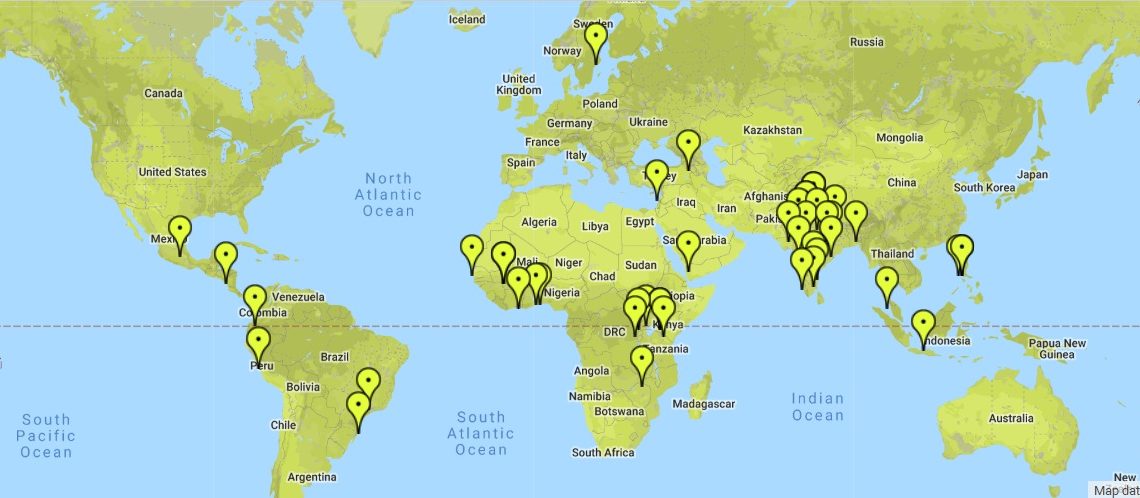
What Sharing Community looks like
Change the system, not just clean up after it.
In Brazil, local groups used sharing to link together the whole consumer chain: food grown in seed-sharing schemes being sold in a co-operative cafe, where visitors were taught sewing techniques to fix old clothes into reusable bags. In the cafe, reusable bags were free to be borrowed by customers, and customers brought in unneeded toys to share with schoolchildren to get the next generation thinking about what they could share.
Speaking a global truth in our local languages
In India, the Gujarati phrase આપ-લે નો ઓટલો (‘give and take’) was used on the streets and in the media. On ‘Ghandhi Jayanti’ (Mahatma Ghandhi’s birthday), volunteers took to the streets of Berhampur, to remind people of a proud Indian tradition of the “environmental, economic, social and cultural benefits of sharing community.”
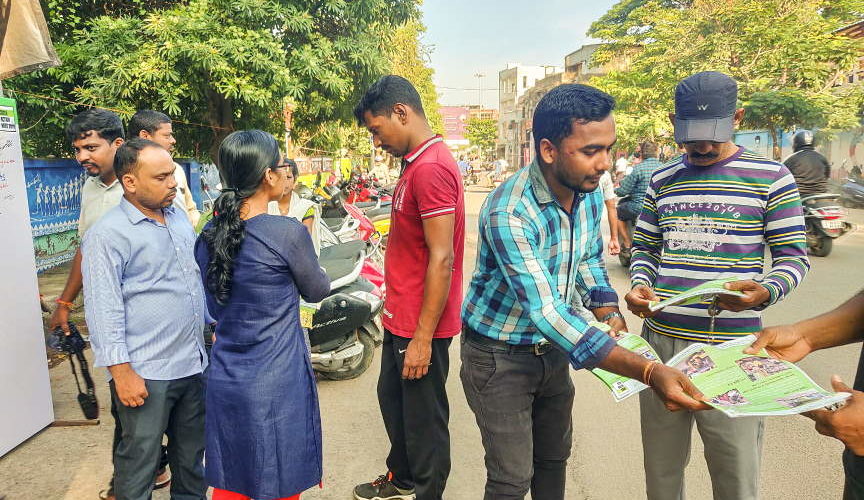
Building stronger community relationships
In Fiji, local seamstresses and weavers were invited to share their skills in how to upcycle old clothing and cast-offs into reusable bags. This was done both to protect their marine ecosystem from plastic bags and to bring new respect to older skills.
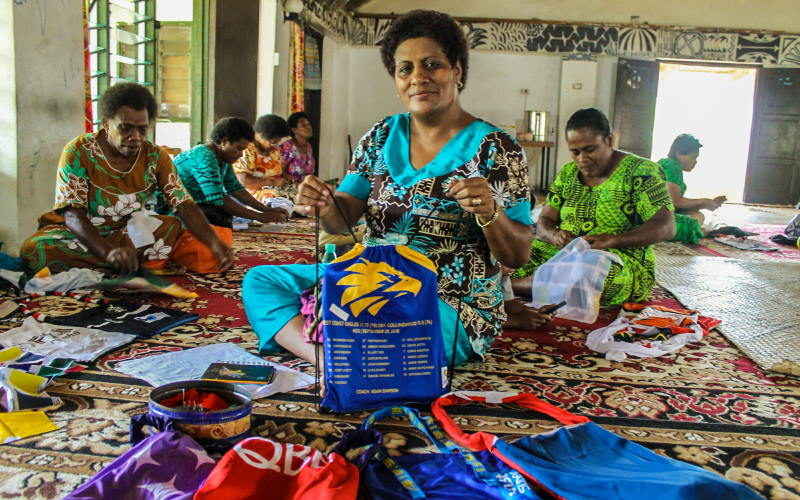
Bringing back local cultures of sharing
In the Philippines, ‘Bayanihan’ – a tradition of communal unity and sharing amongst rural people – is threatened by the prevention of seed-sharing and farmers becoming dependent on corporations’ chemicals and technology, rather than each other. Local groups are creating seed banks, setting up trial farms and campaigning against genetic modification to bring safe, affordable and sustainable food for everyone.
5 steps to a Sharing Community campaign
If you would like to take these steps together as a group, you can download the planning package which includes:
- A facilitator’s guide to help you and your group think through your vision, obstacles, solution, and activities – with suggested exercises. Download here.
- Presentation slides with a video, examples and diagrams to accompany the facilitator’s guide. Download here.
- A planning poster with tips which will help you create a large visual guide of your vision, obstacles, solution and activites which you can put on your wall and helps the whole team stay focused. Download here.
1. Find our vision
Explain what will be different in our community if we are successful.
Can we do it in under 40 words?

- How will you know if you're not needed anymore?
- Don't just imagine a perfect society from above - can you imagine what it looks like in the life of a single person?
- Does this tackle the joint crisis of people and planet?
2. Understand the obstacles
What obstacles are preventing our vision from happening? What are the real causes of these obstacles?
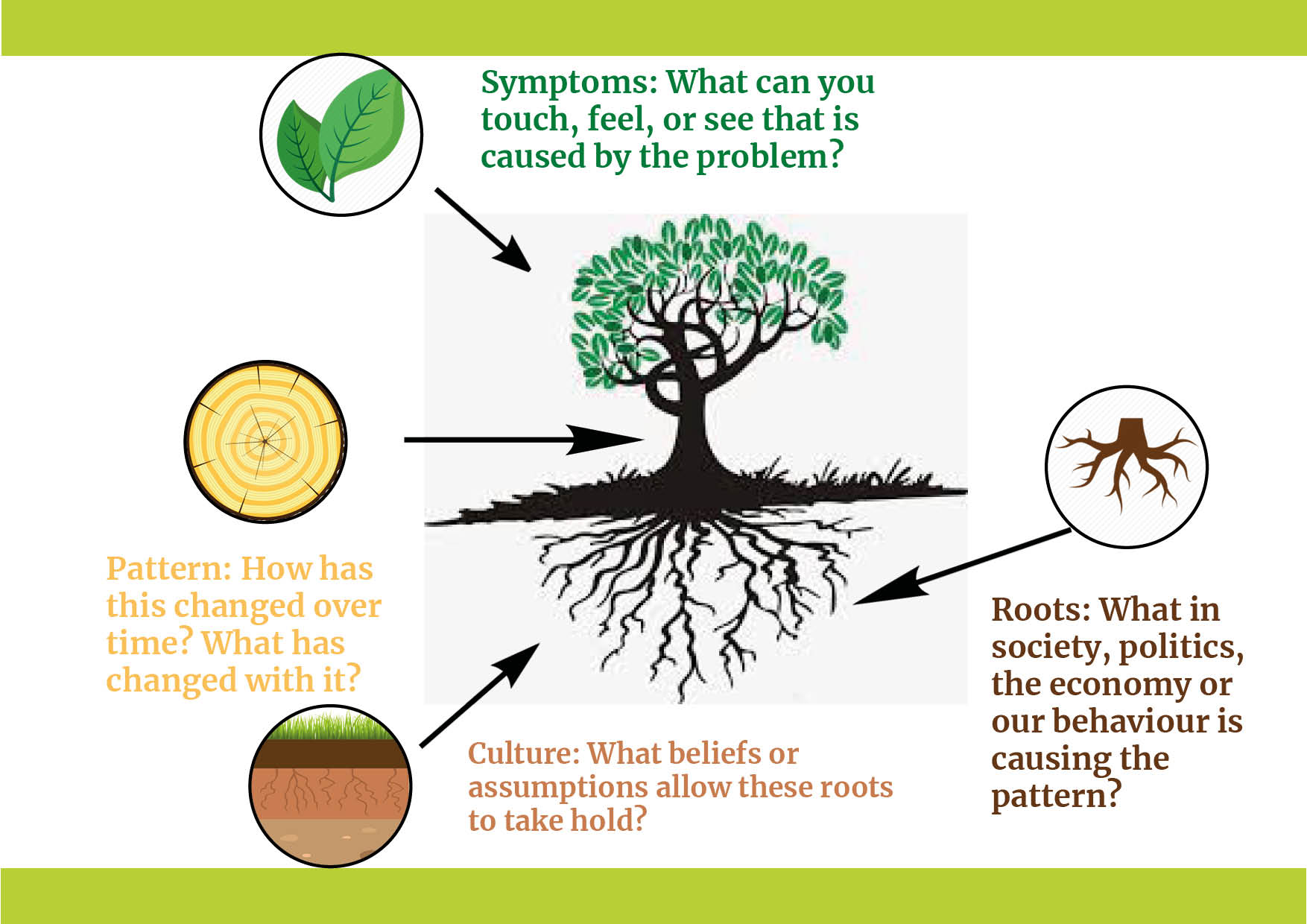

Symptoms: What can you touch, feel, or see that is caused by the problem?
Example: Empty fuel cannisters are littered everywhere – and people are spending a lot of money on fuel.

Patterns: How has this changed over time? What has changed with it?
Example: The fuel prices and litter went up, more people moving into the area.

Roots: What in society, politics, the economy, or our behaviour is causing the pattern?
Example: Government subsidises fuel but not public transport. People need to commute a long way to their jobs.

Culture: What beliefs or assumptions make up the environment for these roots to grow?
Example: “You should take pride in owning your own vehicle”.
“You are responsible for yourself.”
- If our obstacles are mostly 'symptoms' or 'patterns', what could be the 'roots' or 'culture' underneath them?
- If our obstacles are mostly 'roots' or 'culture', can we identify the 'patterns' or 'symptoms' that come from them - to make them feel more real?
- If this obstacle was solved, would our vision be much more likely to come true?
3. Decide our solutions and audiences
What solutions could tackle the obstacles we identified? Who do we need to reach to make them happen?
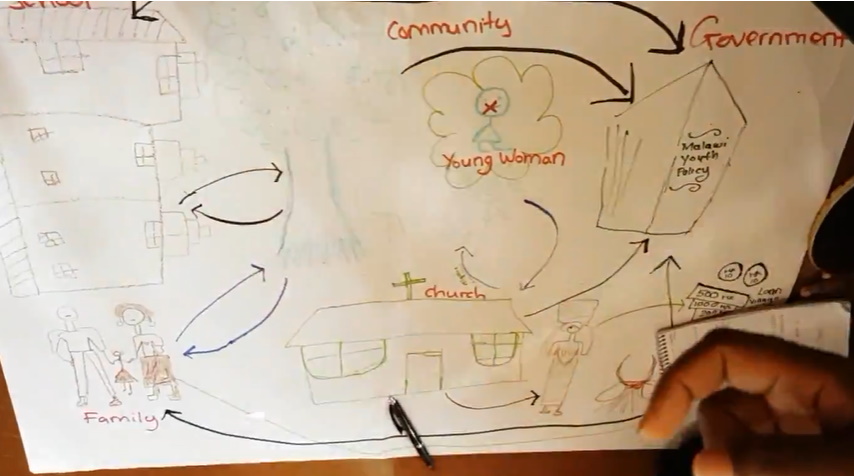
- Are our solutions big enough to match the obstacle?
- Are we just naming categories of audiences (like 'decision makers') or can we go deeper?
- Are we just choosing audiences we are already comfortable with - or do we need to look at different audiences?
4. Plan our activities
What will we actually do to make a sharing community happen?
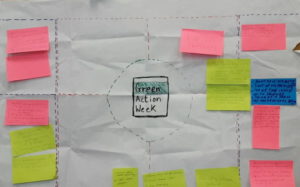
- Are we just listing activities we have done before, or which are easy to do?
- Have we thought about who else (partners, allies, spokespeople, etc) we will need to carry this out?
- Are we staying true to our vision, obstacles, and solutions?
5. Get help to finalise plans
Last year, Green Action Week participants fed back that you appreciated one-to-one communications support, and you would like even more support before the planning submission deadline.
- A group webinar where we can go through the planning process together, you can hear more examples of great Sharing Community campaign activities, and we can answer any questions. Click here for details of the webinar on XXth of April, XX:XX GMT.
- You can book a 30-min call (over Skype, WhatsApp, or another video call software) to get one-to-one support on your plans. Click here to book directly from the calendar.

If you are applying to take part in Green Action Week as a member of Consumers International – you should have received an email from your regional coordinator. If not, you can find more information here.
What is NOT Sharing Community?
Awareness must link to action
‘Sharing knowledge’ through trainings or public awareness campaigns are not, by themselves, relevant to our theme. They must go further to actually change behaviour or systems through sharing and collaboration of goods and/or services.
- Projects with sharing/collaboration of goods and/or services.
- Projects that only involve 'sharing knowledge'
Community, not charity
‘Sharing what you have with those who need it’ should not just be a one-off act of giving charity from rich to poor, but should be an exchange between people. So everyone has better access to goods and services in a way that is environmentally sustainable.
- Activities where everyone can contribute in some way.
- Activities where some people only give and others only receive.
Sharing Community is the method as well as the objective
‘Sharing ideas’ about activities like organic farming, by itself, is not relevant enough to this theme. Our campaigns need to use sharing and collaboration of goods and services as the method of the activities – it is the best way to prove that the sharing community can work.
- Campaigns that prove sharing community works - by doing it.
- Campaigns which only talk about an idea of sharing community.